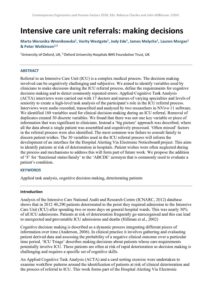| Document | Author Marta Weronika Wronikowska, Verity Westgate, Jody Ede, James Malycha, Lauren Morgan & Peter Watkinson |
| Abstract Referral to an Intensive Care Unit (ICU) is a complex medical process. The decision making involved can be cognitively challenging and subjective. We aimed to identify variables used by clinicians to make decisions during the ICU referral process, define the requirements for cognitive decision making and to detect commonly repeated errors. Applied Cognitive Task Analysis (ACTA) interviews were carried out with 17 doctors and nurses of varying specialties and levels of seniority to create a high-level task analysis of the participant’s role in the ICU referral process. Interviews were audio recorded, transcribed and analysed by two researchers in NVivo 11 software. We identified 188 variables used for clinical decision-making during an ICU referral. Removal of duplicates created 30 discrete variables. We found that there was not one key variable or piece of information that was significant to clinicians. Instead a ‘big picture’ approach was described, where all the data about a single patient was assembled and cognitively processed. ‘Often missed’ factors in the referral process were also identified. The most common was failure to consult family to discern patient wishes. The 30 variables used in the ICU referral process will inform the development of an interface for the Hospital Alerting Via Electronic Noticeboard project. This aims to identify patients at risk of deterioration in hospitals. Patient wishes were often neglected during the process and mechanisms to address this will form part of future work. We propose the addition of ‘F’ for ‘functional status/family’ to the ‘ABCDE’ acronym that is commonly used to evaluate a patient’s condition. |

